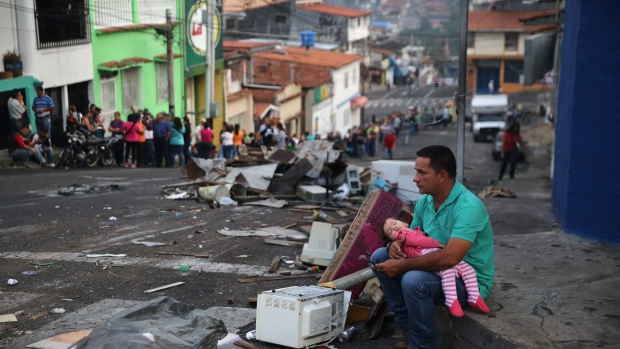In a country plagued by sky-high inflation and an extreme scarcity of food and medicines, confrontations between protesters and the National Bolivarian Guard have led to more than 70 fatalities.

But interpretations of this political crisis as simply a dictatorial regime cracking down on a united and suffering population do not do justice to the complexities and severe polarisation of Venezuelan society.
Jose only protests when he has earned enough to feed his family. Whenever he spots the National Bolivarian Guard while out driving his taxi he calls them “cowardly rats” under his breath.
He studied engineering at university, but because of the economic crisis, there isn’t enough work for people with his skills. So, he has taken up taxi driving on the side.
“We must protest, as much as we can. This government is destroying Venezuela, and if we stop now it will be over. They will have won,” he says.
When asked what he will do if the situation does not improve, Jose says he will leave.
“My son is very small still, but I don’t want him to go to school in a country like this. I want him to have a future and opportunities. With this government, he will have none of that.”
It is a common sentiment here. In marches, people carry signs that read “Luchemos hasta morir si es necesario, por un mejor porvenir” (We fight until we die if necessary, for a better future).
Almost daily thousands of opposition supporters, convoked by their leaders and dressed in white and the colours of the national flag, gather in upmarket neighbourhoods in the east of Caracas.

They then begin their marches towards the city centre, joined along the way by opposition sympathisers from other parts of the city. But they never reach their destination because, time and again, the marches are stopped by riot squads, armed with water cannon, tear gas and rubber bullets.
As the marches come to a halt, it is often youngsters, armed with home-made shields, helmets, gas masks, and some with Molotov cocktails, who make their way to the front. Some cheer them on, others chant “no more violence”.
As the street battles begin, motorbikes drive back and forth, bringing new protesters to the front and returning with those who have been wounded.
The wounded are tended to by the Green Cross, medical students who voluntarily help those injured during the protests.
Fernando Bossi, the director of portalalba.org, a website that provides information on the Latin American “socialist and anti-imperialist project”, says it isn’t the government that is using violence, but the opposition.
“The opposition is trying to defeat a legitimate government. That is why they turn violent. They provoke, in order to get a violent reaction.”
Bossi, who says those police officers who have used excessive force have been imprisoned, describes the opposition as “fascists”.
In fact, several parties in the MUD (the Table of Democratic Unity, which is made up of about 20 opposition parties) identify as centrist or left-of-centre, and three of the largest ones are members of the Socialist International.

